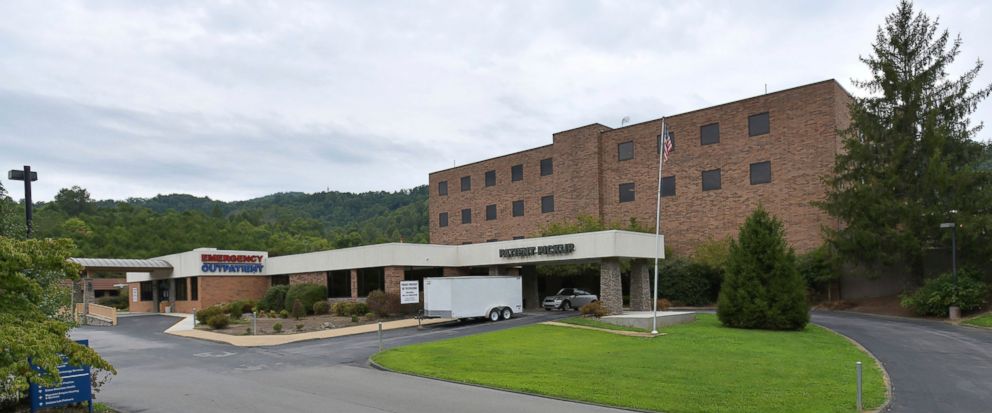It was lunchtime on Election Day and Gary McElyea, a councilman in a small town perched in Virginia’s sprawling westernmost county, was campaigning under a tent when the heart attack struck.
“We were out at the polls, and he just hit the ground,” says fellow Pennington Gap councilwoman Jill Carson, who described an agonizing wait for a helicopter to arrive and whisk McElyea to a Tennessee hospital about 40 miles (64 kilometers) away.
There was nowhere local to go for care because Lee County’s only hospital, about a mile down the road from where McElyea fell ill, abruptly shut its doors in 2013.
In the five years since, local community leaders have been fighting to reopen the facility, and after a series of fits and starts, it looked for much of this year like that might happen thanks to a deal with a startup company. But financial challenges the company acknowledges it’s been working through have thrown the plan into question at the last minute, officials say. It’s a story that illustrates the herculean task of trying to revive a shuttered rural hospital and the harsh realities of disparate access to healthcare in many parts of America.
“Our county desperately needs a hospital,” says Dr. J. Scott Litton Jr., a family medicine doctor and a native of mountainous Lee County, which is home to some 24,000 people. One of Virginia’s poorest counties, hit hard by the opioid crisis and the decline of the coal industry, Lee County stretches some 70 miles (113 kilometers) across, into the corner where the state meets Kentucky and Tennessee.
Litton and other local officials and community leaders say the closure has been devastating, resulting not only in far longer travel times for patients like McElyea but also a strain on emergency services and the local economy. Some are convinced people have died because of a lack of access to care.
Litton says it’s not unusual to have patients waiting in his parking lot before the office opens, often with issues that would be better treated at an emergency department.
“We have patients that walk in with fractures, and patients that walk in with their hand wrapped with a towel with an active, bleeding laceration,” Litton says.

This Aug. 25, 2018, photo shows the Lee County Medical Center in Pennington Gap, Va. Virginia’s westernmost county had appeared to be on track to reopen its only hospital, a rare accomplishment a rural community anywhere in the country. But questions involving the company expected to run the Lee County facility have thrown the plan into question at the last minute. (AP Photo/Earl Neikirk)
Lee County’s long, triangular shape has made the loss of the hospital “a nightmare for emergency responders,” says county administrator Dane Poe.
In some areas, it’s now at least an hour to get to a hospital of any kind, and the closest trauma center is in Kingsport, Tennessee, Poe says. That can mean a three- to four-hour turnaround on a single call for the county’s patchwork of volunteer rescue squads.
The closing also cost the county jobs and has made it harder to recruit new industries or even workers to the area, Poe says.
Many residents were shocked when the hospital’s previous owner announced closure plans in 2013 shortly after renovating the emergency room. But the closure fell in line with a national trend of struggling rural hospitals shutting their doors.
According to the North Carolina Rural Health Research Program at the University of North Carolina at Chapel Hill, 89 rural hospitals have closed since January 2010. Eight have reopened.
Another 673 rural facilities, or about a third nationwide, are vulnerable and could close, according to the National Rural Health Association.
In addition to the challenge of hospital closures, rural America generally has fewer physicians to serve residents more likely than their urban counterparts to be older, uninsured and living in poverty.
After the hospital closure, Lee County rallied. They held organizing meetings, looked for potential new operators and formed a hospital authority, a move that took special approval from the state legislature.
The authority members then obtained a certificate from the state to operate a hospital. They sought advice and help from the state’s congressional delegation.
They purchased the building, then kept it up by paying for basic maintenance on things like the grounds and the boiler system, according to a hospital authority report.
About three years into that effort, Americore Health, a newly formed rural hospital management and acquisition company, approached the group about a reopening.
The company has already invested around $5 million into opening the facility and will likely spend around another $2 million, Americore CEO Grant White said. Plans call for a 25-bed acute care hospital with two general purpose operating rooms opening by Dec. 31 — a deadline under the existing certificate of public need from the state.
By all accounts, Americore had been working diligently on the reopening until mid-August, when work on the project seemed to come to a halt, says Jeff Mitchell, a Blacksburg-based attorney for the authority. Authority members also started seeing news reports about problems at the company’s other hospitals, including unpaid tax bills, payroll snags, layoffs, and disputes with lenders .
The authority recently gave the company two weeks to provide evidence of the “viability and sustainability of the project,” Mitchell says. He said he expects the board to determine at its next meeting Thursday whether it thinks the company can get the hospital reopened and consider next steps.
White says he thinks Americore can satisfy the authority and is committed to seeing the project through.
“We’re pushing full steam ahead to get the place reopened by the end of the year,” he says.
Meanwhile, the community is hoping and praying for the best, McElyea and others say.
“I can’t think of anything more important to Lee County right now, or anytime, than a hospital,” says longtime sheriff Gary Parsons.




